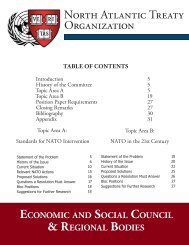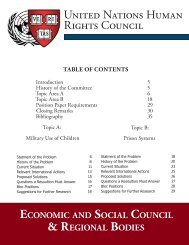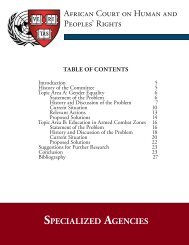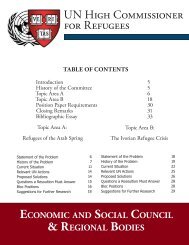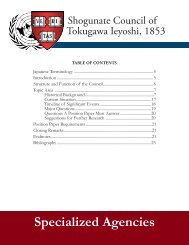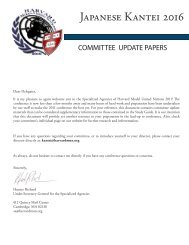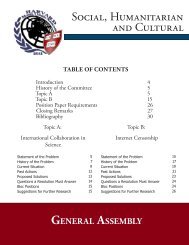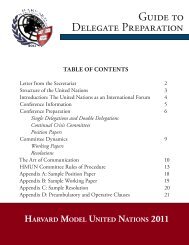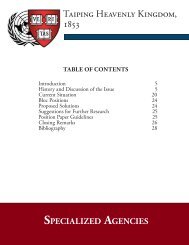World Trade Organization - Harvard Model United Nations
World Trade Organization - Harvard Model United Nations
World Trade Organization - Harvard Model United Nations
You also want an ePaper? Increase the reach of your titles
YUMPU automatically turns print PDFs into web optimized ePapers that Google loves.
<strong>World</strong> <strong>Trade</strong> <strong>Organization</strong><br />
INTRODUCTION<br />
The <strong>World</strong> <strong>Trade</strong> <strong>Organization</strong> faces numerous traderelated<br />
issues. While many of these issues have been<br />
regarding economic development, more non-traditional<br />
concerns have begun to emerge in the past two decades.<br />
In this session of the WTO, we will discuss two of these<br />
topics.<br />
The first topic is “<strong>Trade</strong> and the Environment.”<br />
Concern of the environment is one of the core elements<br />
of the WTO’s mandate. With the intensity of debate<br />
regarding the environment heating up throughout the<br />
world, trade has come to the center. The impact of<br />
trade on the environment is substantial. Think about<br />
the hundreds of thousands of ships, planes, and trains<br />
that transport goods across the world. Massive amounts<br />
of energy are needed to fuel these machines; with more<br />
energy production comes a greater impact on the<br />
environment. With the entrance of the WTO into the<br />
environmental debate, the number<br />
of issues that need to be addressed<br />
has increased. Some argue that<br />
WTO’s trade regulations have led<br />
to the decline of environmental<br />
health while others claim that trade<br />
liberalization helps promote sustainable development.<br />
But the issue is much more complex. The WTO’s trade<br />
regulations and decisions have the potential of conflicting<br />
with multilateral environmental agreements and have<br />
numerous legal aspects that need to be more carefully<br />
thought out.<br />
The second topic is “Aid for <strong>Trade</strong>.” Liberalization<br />
in trade has not benefited every country. Low-income<br />
and least-developed countries suffer from severe supply<br />
side constraints that result in low export and low<br />
trade capacities. These countries need to develop their<br />
infrastructure and human capital systems so that they<br />
may enter the global value chains. Developing countries<br />
must be able to produce the high quantity and quality<br />
levels demanded by other markets. They must also ensure<br />
that they have the physical capacity to manufacture<br />
goods that conform to various national and international<br />
standards. However, only building up the infrastructural<br />
aspects of the manufacturing sector is not enough.<br />
Developing countries also need a better understanding of<br />
the growing complexities of world trade regulations. The<br />
faster their trade capacity grows, the quicker they must<br />
learn the subtleties of international trade agreements.<br />
“These issues are of upmost<br />
importance to you, members of the<br />
WTO, because trade issues are at<br />
the heart of the organization...”<br />
These issues are of upmost importance to you,<br />
members of the WTO, because trade issues are at the<br />
heart of the organization. The WTO establishes the<br />
institutional and legal framework for the world trade<br />
system, so every decision has wide and far-reaching<br />
implications. Please study these issues well and note any<br />
areas you would like to explore more in detail. The most<br />
effective resolutions will not only include the concepts<br />
introduced in this guide but also more in-depth research<br />
that reflects the nuances of these trade debates.<br />
HISTORY OF THE COMMITTEE<br />
The <strong>World</strong> <strong>Trade</strong> <strong>Organization</strong> is an international<br />
organization dedicated to the liberalization of trade,<br />
a forum for governments to debate and negotiate<br />
trade agreements, and a place where countries come<br />
to resolve their trade disputes. The laws of the <strong>World</strong><br />
<strong>Trade</strong> <strong>Organization</strong> make up the institutional and legal<br />
framework of the international<br />
trading system and supersede almost<br />
all national or regional trade laws.<br />
There are currently 153 member<br />
countries and 31 observers in the<br />
WTO, as well as several international<br />
intergovernmental organizations<br />
like the <strong>World</strong> Bank, International Monetary Fund, the<br />
<strong>World</strong> Health <strong>Organization</strong>, <strong>Organization</strong> of American<br />
States, and the UN food program, which have observer<br />
status as well.<br />
The <strong>World</strong> <strong>Trade</strong> <strong>Organization</strong> traces its roots to 1947<br />
with the signing of the General Agreement on Tariffs and<br />
<strong>Trade</strong> (GATT), the dominant institutional framework for<br />
the international trading system for the second half of the<br />
20th century. The main accomplishment of the GATT<br />
was substantial reduction of tariffs and trade barriers<br />
and the elimination of preferences. Each country was<br />
obligated to grant most favored nation status to all other<br />
contracting parties. This did not mean free trade. What<br />
this meant was that a country cannot give preferential<br />
trade treatments in areas such as tariffs to one member of<br />
the WTO and not to another. Tariffs were still legal but<br />
they had to be relatively similar across countries, with a<br />
few exceptions. The GATT also prohibited quantitative<br />
restrictions on imports and exports and tried to promote<br />
trade in developing countries. Most of these agreements<br />
were solidified during the eight rounds of trade talks that<br />
focused on settling trade disputes and negotiating trade<br />
agreements.<br />
4<br />
Specialized General Assembly Agencies




